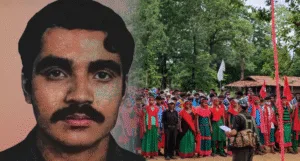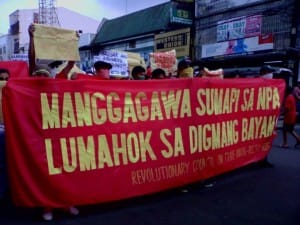LUIS G. JALANDONI
Chairperson, NDFP Negotiating Panel
The National Democratic Front of the Philippines (NDFP) mourns the death of Rev. Fr. Carlos Abesamis, SJ, who loved and served the poor and oppressed, integrated with them and upheld and defended their rights. The NDFP conveys its heartfelt condolences to his family, his friends, and confreres.
In the early 1970s, when the mass struggles of the sugar workers in Negros intensified, Fr. Abe, as he was fondly called by his friends, integrated with the sugar workers together with several colleagues, sharing weal and woe with them in an hacienda of a friendly haciendero for one month. He came out of the experience with a better understanding of the situation of the sugar workers and a deep respect and admiration for them. He made it clear that he stood firmly on the side of the sugar workers.
LUIS G. JALANDONI
Chairperson, NDFP Negotiating Panel
The National Democratic Front of the Philippines (NDFP) mourns the death of Rev. Fr. Carlos Abesamis, SJ, who loved and served the poor and oppressed, integrated with them and upheld and defended their rights. The NDFP conveys its heartfelt condolences to his family, his friends, and confreres.
In the early 1970s, when the mass struggles of the sugar workers in Negros intensified, Fr. Abe, as he was fondly called by his friends, integrated with the sugar workers together with several colleagues, sharing weal and woe with them in an hacienda of a friendly haciendero for one month. He came out of the experience with a better understanding of the situation of the sugar workers and a deep respect and admiration for them. He made it clear that he stood firmly on the side of the sugar workers.
After his experience with the sugar workers, Fr. Abe decided to gather a few seminarians and live in an urban poor community. It was the tumultuous period following the First Quarter Storm. Abe chose to live in a small cottage in Baranka, Marikina, in a community of urban poor and workers, together with three Jesuit seminarians, in the spirit of integrating with the people. The urban poor community is situated between the sprawling grounds of the Ateneo de Manila University atop the hill and factories like U-TEX and Manila Bay Hosiery Mills below. Many of the urban poor worked in these factories.
He said mass every Sunday in the small community chapel and his sermons often dealt with the lives of the working people and about social injustice making the few wealthy mass-goers wiggle uncomfortably in their seats.
In his book, “Backpack of a Jesus-Seeker”, Fr. Abe spoke about Jesus thus:
“Jesus put primacy on the human being and human life over and against the accepted tradition and law.
“He was a rebel against tradition. In the eyes of the institution he was not only a non-conformist. He may even have been looked on as a heretic by ultra-conservatives.
“’Justice-and-compassion’ would have been the inscription on his headband if he had worn one.
”He was unabashedly for the poor and stern towards the rich.
"He aims and fires at the establishment. He censured the aristocracy.”
Those who knew Fr. Abe well would say that these things can very well be said of Fr. Abe himself. He often explained that contrary to traditional catechism, “the Kingdom of God” is not in some unknown future or somewhere up there above the clouds but is here and now. And it is the task of humanity to make the “Kingdom of God” a reality – a world where there is no exploitation and oppression of man by man, a world where justice reigns.
It was customary in the 1970s to make the distinction between Natdems and Socdems, radicals and moderates, revolutionaries and reformists among the religious. Fr. Abe clearly put himself on the side of the Natdems, the radicals, the revolutionaries.
Fr. Abe was a quiet revolutionary. He avoided the limelight preferring to work quietly among the poor and among his natural constituency – the clergy and laity in the Christian community. It is in this arena where Fr. Abe, making use of his knowledge of the Scriptures, tried to convey his message of struggle, liberation, justice, bias for the poor and oppressed, through his writings, in retreats, recollections, seminars and joining the people in strikes, pickets and street marches.
I had the privilege of meeting Fr. Abe in 1971 and facilitating his integration with sugar workers. We exchanged views and insights on the struggle of the sugar workers and the national democratic line and program. In 1972 I listened as he gave a powerful lecture on the Scriptures. Then in 1998 I saw him again during a militant march in Manila on Independence Day.
The Filipino people will long remember and honor Fr. Abe who loved and served the poor and oppressed, who quietly gave powerful testimony in word and especially in deeds of his commitment to the national and social liberation of the Filipino people and of his deep Christian faith.
Long live the noble example, memory and inspiration of Fr. Abe!





